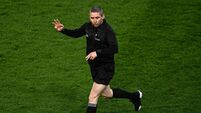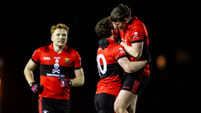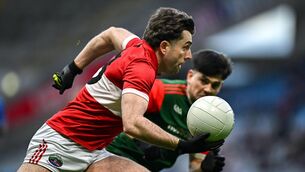Great footballers, great people
SUNDAY mornings, Wednesday evenings, no difference. Training for the Cork Ladies footballers. The All-Ireland champions nine out of the last ten years. There are no supporters, before or after, and no-one’s giving out free gear or kit bags. The only bags for free are teabags, for those who’ve travelled a distance. Like Mairead Kelly from Ballydesmond.
“She was a sub for five years — she played rugby too with Munster — but she eventually made the team. When she was in college she’d come down from Limerick at her own expense,” manager, or trainer as he prefers, Eamonn Ryan explains.














